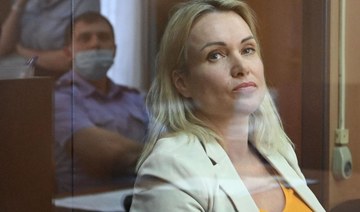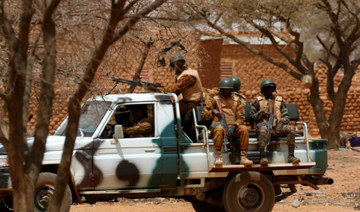JEDDAH: Roger Harrison, who has died on the Spanish island of Mallorca at the age of 75, was a man of more than one career and many talents — among them an event organizer, a writer and photographer, a jeweler and gemologist, a lecturer and raconteur.
Here at Arab News, where he was a senior reporter from 2001 to 2013 covering Saudi affairs and expat life, he will be best remembered as a news magnet to whom stories simply happened.
Among Harrison’s many achievements was his work on the book Wings Over Arabia, a photographic record of a three-man glider team flying over and photographing spectacular and rarely seen areas of the Kingdom. The team included Prince Sultan bin Salman, the first Arab and Muslim astronaut, and Prince Bandar bin Khaled Al-Faisal.
In his preface to the book, Prince Bandar paid tribute to Harrison’s abilities and his work: “He captures the beauty of my country from a perspective that most of the population will never experience. I thank him sincerely for writing and photographing a definitive work that is both a fascinating story and, perhaps, a source of inspiration for future glider pilots.”
So fascinated was the British historian Robert Lacey by Harrison’s work that he wrote: “Lawrence of Arabia captured it from a camel. Roger Harrison captures it from the air. Both convey the magic of Arabia with breathtaking power.”
Harrison was also one of the last journalists to interview the famed explorer of Arabia and the Middle East, Sir Wilfred Thesiger, in 2002.
Stories had a way of coming to Harrison. One of his last visits to Saudi Arabia was in October 2019, when he was invited to a government-sponsored media conference just as visas on arrival became available to foreigners. Harrison flew into Jeddah from London, and offered to pay the visa fee by credit card, prompting a bank security request to enter a one-time password — which was sent to his cell phone back in London. It seemed an insoluble problem, but the Saudi officer at the airport offered to pay the fee. Harrison assured him he would be repaid as soon as the problem was sorted out, but the officer said: “You are our guest. You don’t have to worry.”
Later Harrison regaled the Arab News Jeddah newsroom with the tale, his eyes filling with tears as he told how a complete stranger had come unhesitatingly to his assistance. He loved Saudi Arabia, and the Saudis loved him back in equal measure.
Harrison was born in Eastbourne, England, in 1946. He arrived in Saudi Arabia with his wife Sian in September 1996, to teach at Jubail Industrial College, where he remained for four years. The couple then went back to London, but the Kingdom had made its mark on Harrison and he returned to Jeddah to teach English to the Saudi Navy.
Harrison’s career with Arab News began by accident — quite literally. He and his wife were involved in a collision with a car that came out of the desert and ran straight into them. Harrison wrote a letter to the newspaper describing the incident, and Arab News replied asking him to write it in the form of an article rather than a letter. The piece appeared on the front page under the headline: “Why throw yourself to death when you can drive there?” The article led to an offer of employment at Arab News.
“He loved the people he worked with and he loved the opportunities the paper gave him,” his wife Sian said. “He went to places he would never have visited and was even able to indulge his love of racing by test-driving cars he could never have owned. The articles he wrote, especially ‘Adam and Eid,’ showed the depth of his humanity and his love of Saudi Arabia and its people. There were so many articles that displayed this empathetic side of Roger. The one he wrote after the dreadful floods of Jeddah was more personal, about the many friends who helped us.”
The Harrisons left Jeddah in 2013 and went to live in Ras Al-Khaimah in the UAE. He had visited once to write an article, and liked the idea of being there while still close to Saudi Arabia. The couple’s son Ben, a newly qualified teacher, came from London to join them and applied for his first teaching post — in Riyadh. “Roger was thrilled the Harrison connection was continuing in the Kingdom and gave him a reason to visit,” Sian said. “Ben left Riyadh in 2019 and was going to accompany Roger on a trip to Saudi Arabia in January, when they wanted to do a follow-up to the Wings Over Arabia book, but this time from the ground.”
Ben Harrison hopes to return for a visit, and would love to be able to honor his father’s last wish.
In 2017, the Harrisons moved to Mallorca, which they knew well from visits over the years. Why Mallorca? “We had been visiting the beautiful Spanish island for over 20 years since my sister had moved to live there,” said Sian. “My mother also sold up and left London to live in Mallorca. She was very close to Roger. They loved to debate and had many spirited conversations, and the highlight of their week was a shopping trip to Lidl where they discussed anything and everything.”
Sian has received many messages of condolence from people who knew her husband. “They have shown me a side of him that truly shows the honorable and honest man he was, his old-fashioned values of being true to your word, his love for the Kingdom and the opportunities it gave him. I can’t stress enough how much being in Saudi Arabia meant to him.”
Harrison had great respect for Saudi Arabia, and was adamant in correcting people’s misconceptions about the Kingdom. He regularly called UK radio stations and wrote letters to various publications out of a sincere desire to set the record straight. As Prince Sultan bin Salman once said, Harrison knew more about Saudi Arabia than most Saudis.
“Although I never had the pleasure of working with Roger, I have crossed paths many times with him covering events in Jeddah in the early 2000s. He was full of passion for journalism and for the Kingdom, was kind to everyone around him and was always the first to arrive and last to leave during any press event,” said Faisal J. Abbas, current Editor in Chief of Arab News.
“Obviously, we at Arab News extend our condolences to Roger’s family, and on behalf of all the editors and colleagues he worked with in the past, we thank him for all the work he has done and all his contributions to our newspaper,” he added.
Harrison’s motto was: “Everybody dies, but some never live.” He lived a remarkable life in a remarkable country, and documented all that he could for future historians and writers of Arabia. He was a gentle soul, a humanist first and journalist last. Among those who admired and respected him is Razan Baker, director of international communication at the Saudi Arabian Olympic Committee.
“He touched many lives, including my own, and for that I consider myself lucky,” she said. “I was honored to know him as one of my dearest Arab News family members. He was always inspiring and motivating. Nothing was impossible for him. He was like a generous moving library that challenged us all to learn, be passionate about what we love and do, and try to do it better.”
Remembering Roger Harrison: He loved the Kingdom, and Saudis loved him back in equal measure
https://arab.news/c88cm
Remembering Roger Harrison: He loved the Kingdom, and Saudis loved him back in equal measure
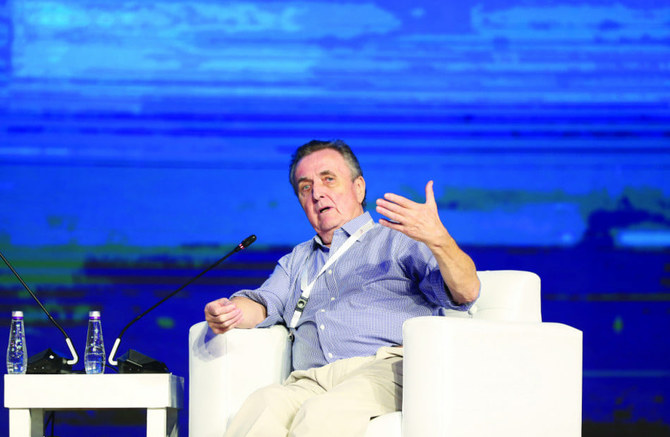
- Family, friends and former colleagues mourn man of many talents with 25-year connection to Saudi Arabia
Humanity at a turning point, Saudi minister tells WEF meeting in Riyadh

- Saudi Arabia wants to lead ‘intelligence revolution,’ Abdullah Al-Swaha, communications and information technology minister, says
- Industry leaders ‘must master AI within years or face irrelevance’
RIYADH: Humanity is at a turning point, pivoting from digital to artificial intelligence, and shifting from the industrial revolution to the intelligence revolution, a senior Saudi official told the special two-day World Economic Forum meeting in Riyadh.
“The world today is not at a tipping point but at a turning point in humanity, which means weare pivoting from digital to AI and maybe later on quantum,” Abdullah Al-Swaha, minister of communications and information technology, said.
Saudi Arabia is ready to embrace that shift, he added.
“The Kingdom is excited with its partnerships with countries and international organizations to carve a path toward inclusive AI adoption,” Al-Swaha told the panel.
“We are pushing today an inclusive agenda, that is innovative, and indisputably multistakeholder to make sure that we lead and leapfrog in this era.”
The Saudi minister noted that global economic output today is worth $100 trillion, of which $32 trillion is attributed to the labor force, and $1 trillion of that ‘is being augmented, accelerated and democratized by generated AI.’
“Over the next five to seven years, it is projected to go to 40 percent. That’s 43 percent of the labor force productivity. And this is why we are pivoting toward intelligence revolution,” Al-Swaha said.
He also cautioned that if “talents and leaders” did not master AI within six or seven years, “they will become irrelevant for any industry they are in.”
‘Saudi Arabia at forefront of AI,’ says business leader at World Economic Forum
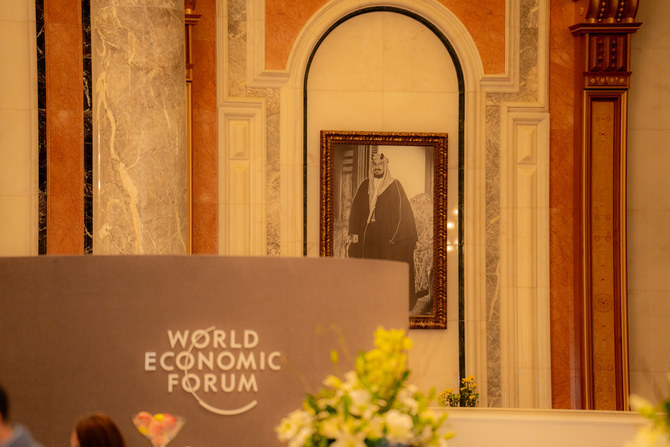
- Saudi Arabia 'really a driver of not only the economy of the region, but also the economy of the world,' says global vice chair and chair of Europe, MENA at consulting firm AlixPartners
RIYADH: Saudi Arabia’s role in technology advancement is helping to drive not only the regional but also the global economy, business leaders told Arab News at the World Economic Forum special meeting in Riyadh on Sunday.
The Kingdom has been “at the forefront” on artificial intelligence, Stefano Aversa, global vice chair and chair of Europe, the Middle and North Africa at consulting firm AlixPartners, said.
While the war in Gaza and broader Middle East tensions are expected to get top billing at the WEF Special Meeting on Global Collaboration, Growth and Energy for Development, technology’s role as a driver of change is also expected to be a major talking point.
Around 1,000 leaders from 92 countries have gathered in Riyadh for the two-day forum.
Saudi Arabia is “really a driver of not only the economy of the region, but also the economy of the world,” Aversa said.
“There are a lot of investors interested, and so it is important to stay close to some of the giga-projects here that will drive not only the growth of the Kingdom, but also the growth of some entire sectors, like energy transition.”
He said that the Kingdom’s move from “an early stage of development to more mature selective investment” is also important.
AlixPartners CEO Simon Freakley said that disruption is a looming issue for global industries ranging from automotive and aerospace to retail.
He defined disruption as “displacement of businesses, markets, and value networks as a result of economic, societal, environmental, political, regulatory, or technological changes.”
Freakley told Arab News that shipping routes, for example, faced disruption because of tensions in the Red Sea.
“Problems are caused by conflicts around the world or other challenges. What we’re finding is some of these themes go cross-industry, not just within industry.”
AlixPartners has 26 offices in 14 countries. Its fifth annual Disruption Index, based on a survey of 3,100 senior executives around the world, showed that 61 percent of CEOs worry they will be unable to keep pace with changing business cycles.
Freakley said: “This disruption work that we now do every year has become a sort of a touchstone of how we help people understand what the best companies, the best leaders, are doing.”
The consulting firm has predicted AI will become the single biggest driver of change across industries, not only as a defense against competitors, but also as a tool to enhance go-to market strategies.
“The people that are winning are the people that have the best data, and weaponize their data to actually get a competitive advantage. How people are using AI and the insight from their data to drive their growth is where we see the real opportunity,” Freakley said.
Two Russian journalists jailed on ‘extremism’ charges for alleged work for Navalny group
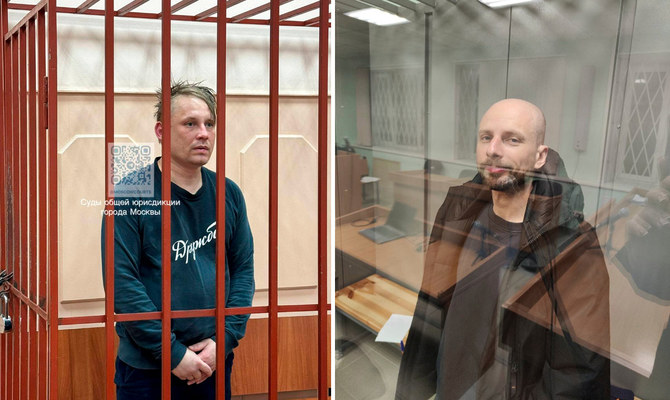
- Konstantin Gabov and Sergey Karelin both denied the charges for which they will be detained for a minimum of two months before any trials begin
- Russia’s crackdown is aimed at opposition figures, journalists, activists, members of the LGBTQ+ community, and other dissenters
LONDON: Two Russian journalists were arrested by their government on “extremism” charges and ordered by courts there on Saturday to remain in custody pending investigation and trial on accusations of working for a group founded by the late Russian opposition politician Alexei Navalny.
Konstantin Gabov and Sergey Karelin both denied the charges for which they will be detained for a minimum of two months before any trials begin. Each faces a minimum of two years in prison and a maximum of six years for alleged “participation in an extremist organization,” according to Russian courts.
They are just the latest journalists arrested amid a Russian government crackdown on dissent and independent media that intensified after its full-scale invasion of Ukraine more than two years ago. The Russian government passed laws criminalizing what it deems false information about the military, or statements seen as discrediting the military, effectively outlawing any criticism of the war in Ukraine or speech that deviates from the official narrative.
A journalist for the Russian edition of Forbes magazine, Sergei Mingazov, was detained on charges of spreading false information about the Russian military, his lawyer said Friday.
Gabov and Karelin are accused of preparing materials for a YouTube channel run by Navalny’s Foundation for Fighting Corruption, which has been outlawed by Russian authorities. Navalny died in an Arctic penal colony in February.
Gabov, who was detained in Moscow, is a freelance producer who has worked for multiple organizations, including Reuters, the court press service said. Reuters did not immediately comment on the ruling by the court.
Karelin, who has dual citizenship with Israel, was detained Friday night in Russia’s northern Murmansk region.
Karelin, 41, has worked for a number of outlets, including for The Associated Press. He was a cameraman for German media outlet Deutsche Welle until the Kremlin banned the outlet from operating in Russia in February 2022.
“The Associated Press is very concerned by the detention of Russian video journalist Sergey Karelin,” the AP said in a statement. “We are seeking additional information.”
Russia’s crackdown on dissent is aimed at opposition figures, journalists, activists, members of the LGBTQ+ community, and ordinary Russians critical of the Kremlin. A number of journalists have been jailed in relation to their coverage of Navalny, including Antonina Favorskaya, who remains in pre-trial detention at least until May 28 following a hearing last month.
Favorskaya was detained and accused by Russian authorities of taking part in an “extremist organization” by posting on the social media platforms of Navalny’s Foundation. She covered Navalny’s court hearings for years and filmed the last video of Navalny before he died in the penal colony.
Kira Yarmysh, Navalny’s spokeswoman, said that Favorskaya did not publish anything on the Foundation’s platforms and suggested that Russian authorities have targeted her because she was doing her job as a journalist.
Evan Gershkovich, a 32-year-old American reporter for The Wall Street Journal, is awaiting trial on espionage charges at Moscow’s notorious Lefortovo Prison. Both Gershkovich and his employer have vehemently denied the charges.
Gershkovich was detained in March 2023 while on a reporting trip and has spent over a year in jail; authorities have not detailed what, if any, evidence they have to support the espionage charges.
The US government has declared Gershkovich wrongfully detained, with officials accusing Moscow of using the journalist as a pawn for political ends.
The Russian government has also cracked down on opposition figures. One prominent activist, Vladimir Kara-Murza was sentenced to 25 years.
US State Department Arabic spokesperson resigns in opposition to Gaza policy
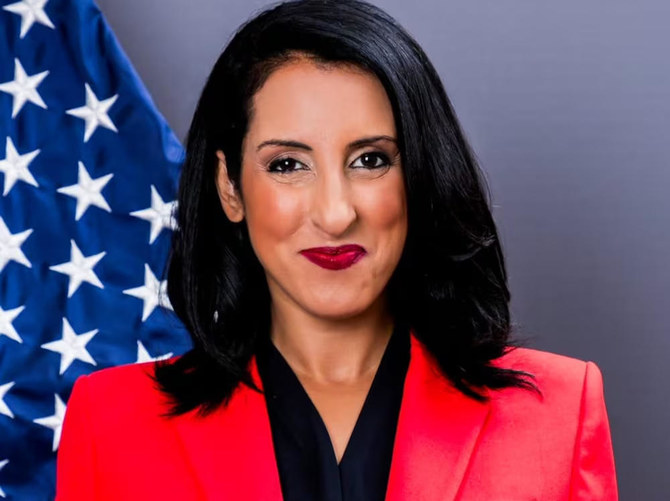
- Hala Rharrit is at least the third person to resign from the department over the issue
WASHINGTON: The Arabic language spokesperson of the US State Department has resigned, citing her opposition to Washington’s policy related to the war in Gaza, in at least the third resignation from the department over the issue.
Hala Rharrit was also the Dubai Regional Media Hub’s deputy director and joined the State Department almost two decades ago as a political and human rights officer, the department’s website showed.
“I resigned April 2024 after 18 years of distinguished service in opposition to the United States’ Gaza policy,” she wrote on social media website LinkedIn. A State Department spokesperson, asked about the resignation in Thursday’s press briefing, said the department has channels for its workforce to share views when it disagrees with government policies.
Nearly a month earlier, Annelle Sheline of the State Department’s human rights bureau announced her resignation, and State Department official Josh Paul resigned in October.
A senior official in the US Education Department, Tariq Habash, who is Palestinian-American, had stepped down in January.
The United States has come under mounting criticism internationally and from human rights groups over its support for Israel amid Israel’s ongoing assault in Gaza that has killed tens of thousands and caused a humanitarian crisis.
There have been reports of signs of dissent in the administration of President Joe Biden as deaths continue to grow in the war.
In November, more than 1,000 officials in the US Agency for International Development (USAID), part of the State Department, signed an open letter calling for an immediate ceasefire. Cables criticizing the administration’s policy have also been filed with the State Department’s internal “dissent channel.”
The war has also caused intense discourse and anti-war demonstrations across the United States, Israel’s most important ally.
Palestinian Islamist group Hamas attacked Israel on Oct. 7, killing 1,200 people, according to Israeli tallies. Israel has killed over 34,000 people in Hamas-governed Gaza, according to Gaza’s health ministry, leading to widespread displacement, hunger and genocide allegations that Israel denies.
Burkina Faso suspends BBC, VOA radio broadcasts over killings coverage
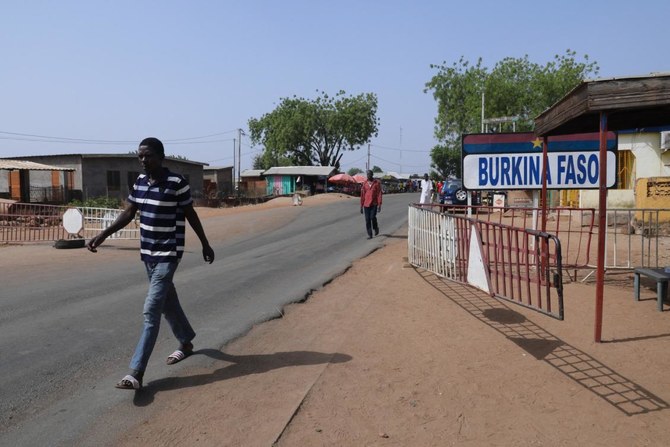
- Authorities handed two-week suspension for covering of report accusing the army of extrajudicial killings
- Human Rights Watch report says military executed about 223 villagers, including at least 56 children
LONDON: Burkina Faso has suspended the radio broadcasts of BBC Africa and the US-funded Voice of America (VOA) for two weeks over their coverage of a Human Rights Watch (HRW) report accusing the army of extrajudicial killings, authorities said late on Thursday.
In the report based on its own investigation, the rights watchdog said the West African country’s military summarily executed about 223 villagers, including at least 56 children, in February as part of a campaign against civilians accused of collaborating with jihadist militants.
HRW said the Burkinabe army has repeatedly committed mass atrocities against civilians in the name of fighting terrorism, and it called on authorities to investigate the massacres.
The country’s communication council said HRW’s report contained “peremptory and tendentious” declarations against the army likely to create public disorder and it would suspend the programs of the broadcasters over their coverage of the story.
Authorities also said in a statement they had ordered Internet service providers to suspend access to the websites and other digital platforms of the BBC, VOA and Human Rights Watch from Burkina Faso.
“VOA stands by its reporting about Burkina Faso and intends to continue to fully and fairly cover events in that country,” Acting VOA Director John Lippman said in a statement.
“The Voice of America strictly adheres to the principles of accurate, balanced and comprehensive journalism, therefore, we ask the government of Burkina Faso to reconsider this troubling decision.”
HRW conducted its investigation after a regional prosecutor said in March that about 170 people were executed by unidentified assailants during attacks on the villages of Komsilga, Nodin and Soro.
Burkina Faso is one of several Sahel nations that have been struggling to contain Islamist insurgencies linked to Al-Qaeda and Islamic State that have spread from neighboring Mali since 2012, killing thousands and displacing millions.
Frustrations over authorities’ failure to protect civilians have contributed to two coups in Mali, two in Burkina Faso and one in Niger since 2020.






